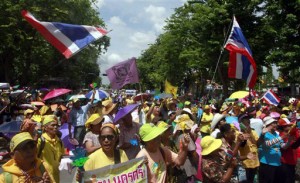
Members of the People's Alliance for Democracy, or Yellow Shirt group, stage a noisy rally opposing the “reconciliation” bill outside the parliament building in Bangkok on May 31, 2012. Thailand's government on Tuesday, June 12, 2012, that it was postponing voting in parliament on the controversial bill, which could herald the return of divisive former Prime Minister Thaksin Shinawatra. AP PHOTO/APICHART WEERAWONG
BANGKOK—Thailand’s government said on Tuesday that it was postponing voting in parliament on controversial “reconciliation” proposals that have stoked political tensions in the divided kingdom.
The bills are strongly opposed by opposition MPs who fear they will be used to grant an amnesty to fugitive former premier Thaksin Shinawatra, ousted by royalist generals in a 2006 coup.
The cabinet agreed to seek a royal decree to end the current parliamentary session on June 19, said government spokeswoman Sansanee Nakpong.
“It’s not about being brave or a coward, surrendering or not surrendering, but I want all parties to face each other and talk,” Lower House Speaker Somsak Kiatsuranont said as he announced the move in parliament.
Thaksin, a former telecoms tycoon who lives in Dubai to avoid a jail term for corruption, is loved by many rural and poor Thais for his populist policies while in power, but hated by the elite who see him as a threat to the monarchy.
Thaksin’s sister Yingluck Shinawatra is now prime minister following a landslide election win by her brother’s party last year.
One of the draft laws, which aims to amend the kingdom’s constitution, has angered royalists who see it as an attempt to weaken the monarchy.
Thousands of royalist “Yellow Shirt” protesters blockaded parliament last month to prevent the house from discussing the reconciliation plans.
The government’s moves have also put it at odds with the judiciary: the Constitutional Court ordered a halt to voting on the charter amendment bill after a complaint by senators that it aimed to overthrow the monarchy.
The government has not scrapped its plan to change the constitution, Sansanee said.
“Prime Minister Yingluck said clearly during the cabinet meeting that her government insisted to go ahead with charter amendment as she promised during her policy statement,” Sansanee said.
“But the government agreed to end the session to enable brainstorming by all parties and to create a favorable climate,” she added.
Earlier this month Yingluck warned Thailand faces a “cycle of violence” unless steps are taken toward reconciliation after years of civil unrest.
In 2010 mass protests by Thaksin’s “Red Shirt” supporters against the previous government descended into the kingdom’s worst civil violence in decades, with more than 90 people killed in a military crackdown.